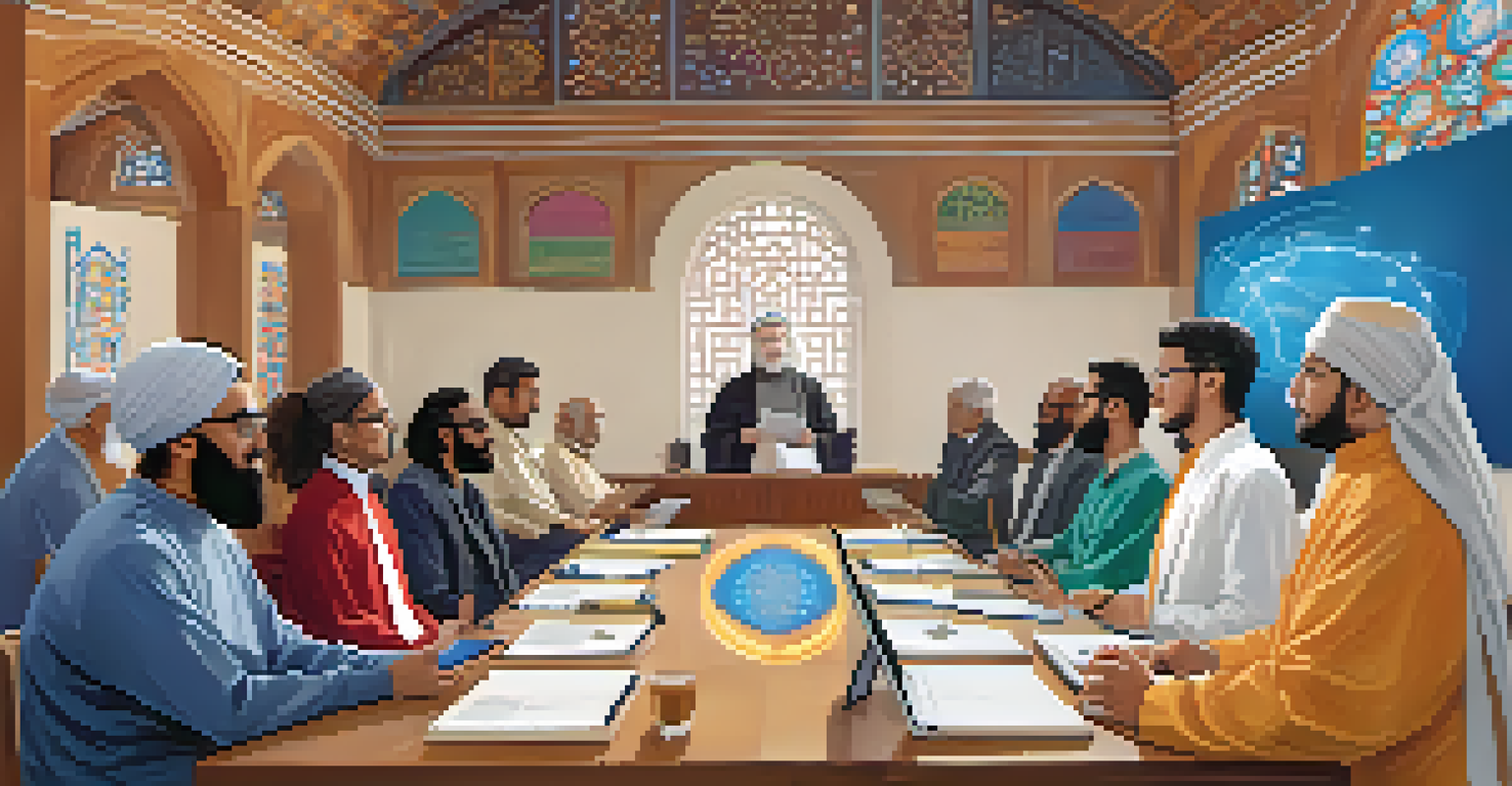Interfaith Dialogue: A Key to Global Citizenship and Responsibility

Understanding Interfaith Dialogue and Its Importance
Interfaith dialogue involves open, respectful conversations between individuals of different faiths. It's a platform where diverse beliefs can coexist, allowing participants to learn from one another. This kind of dialogue is crucial in today's interconnected world, where misunderstandings can lead to conflict.
Peace cannot be kept by force; it can only be achieved by understanding.
At its core, interfaith dialogue promotes empathy and understanding. By engaging with others, we not only learn about their beliefs but also reflect on our own. This mutual exploration creates a richer tapestry of human experience, fostering respect for diversity.
Moreover, interfaith dialogue acts as a bridge to overcoming stereotypes and prejudices. When people come together to share their stories, they humanize their beliefs, dismantling the walls of ignorance that often divide us.
The Role of Global Citizenship in Interfaith Dialogue
Global citizenship encourages us to see ourselves as part of a larger community that transcends national borders. It emphasizes our shared responsibilities towards one another and the planet. Interfaith dialogue is a vital component of this perspective, as it nurtures connections across cultures.

By participating in interfaith conversations, individuals practice global citizenship in action. They learn the importance of inclusive dialogue and how it contributes to a more peaceful world. This shared sense of responsibility fosters harmony and encourages collaborative problem-solving.
Interfaith Dialogue Fosters Understanding
Engaging in interfaith dialogue promotes empathy, allowing individuals to learn from diverse beliefs and reflect on their own.
In essence, global citizenship is about recognizing our interconnectedness. Through interfaith dialogue, we cultivate a sense of belonging that embraces diversity, promoting a more equitable and just society for everyone.
How Interfaith Dialogue Encourages Peacebuilding
Interfaith dialogue plays a pivotal role in peacebuilding by addressing the root causes of conflict. When individuals from different faiths engage in meaningful discussions, they can identify common values and goals. This shared understanding is crucial for building lasting peace.
In diversity, there is beauty and there is strength.
Furthermore, dialogue fosters collaboration among communities. By working together towards common objectives, diverse groups can create initiatives that address social issues, such as poverty and inequality. This collaborative spirit is essential for sustainable peace.
Ultimately, interfaith dialogue empowers communities to resolve conflicts peacefully. By equipping individuals with the skills to communicate effectively, it nurtures a culture of understanding that can withstand external pressures.
Building Empathy Through Shared Stories
One of the most powerful aspects of interfaith dialogue is the opportunity to share personal stories. When individuals recount their experiences, they allow others to see the world through their eyes. This exchange of narratives fosters empathy, breaking down barriers that often separate us.
Storytelling also emphasizes our common humanity. Regardless of our faith, we all have stories of love, loss, and hope. By connecting on this emotional level, we create bonds that transcend differences and build trust among diverse groups.
Global Citizenship Enhances Dialogue
Global citizenship encourages connections across cultures, making interfaith dialogue essential for building a peaceful and equitable world.
Moreover, sharing stories can inspire action. When people hear about the challenges faced by others, they may feel compelled to support initiatives that promote justice and equality. This ripple effect is vital for nurturing a compassionate global community.
The Impact of Technology on Interfaith Dialogue
In today's digital age, technology has transformed how we engage in interfaith dialogue. Online platforms allow individuals from around the world to connect, share ideas, and participate in discussions. This accessibility increases the reach and impact of interfaith initiatives.
Social media, podcasts, and webinars serve as valuable tools for promoting understanding. They provide a space for diverse voices to be heard, encouraging conversations that might not occur in traditional settings. This democratization of dialogue fosters inclusivity and innovation.
However, it's important to approach technology with caution. While it offers great potential for connection, it can also amplify misunderstandings and conflicts. Striking a balance between online and offline interactions is essential for cultivating genuine relationships.
Challenges Faced in Interfaith Dialogue
Despite its many benefits, interfaith dialogue is not without challenges. Miscommunication, stereotypes, and deep-seated prejudices can hinder honest conversations. Addressing these issues requires patience and a commitment to understanding.
Additionally, fear of judgment can prevent individuals from fully engaging in dialogue. Many people worry that sharing their beliefs may lead to conflict or ridicule. Creating a safe space where all voices are welcome is crucial for fostering open discussions.
Technology Amplifies Dialogue's Reach
In the digital age, technology expands the accessibility and impact of interfaith dialogue, though it requires careful management to avoid misunderstandings.
Lastly, differing interpretations of faith can complicate dialogues. Navigating these differences requires skill and sensitivity. Encouraging participants to focus on common values rather than divisive issues can help overcome these barriers.
The Future of Interfaith Dialogue and Global Responsibility
Looking ahead, the future of interfaith dialogue is promising yet requires ongoing commitment. As global challenges continue to escalate, the need for collaboration among diverse groups becomes ever more critical. Interfaith dialogue can serve as a foundation for this collaboration.
Educational institutions, religious organizations, and community groups can play a vital role in promoting interfaith initiatives. By incorporating dialogue into curricula and community programs, we can equip future generations with the skills needed to engage constructively.

Ultimately, embracing interfaith dialogue as a key element of global citizenship will lead to a more compassionate world. By working together, we can build a future that honors diversity while fostering shared responsibility for our planet and each other.